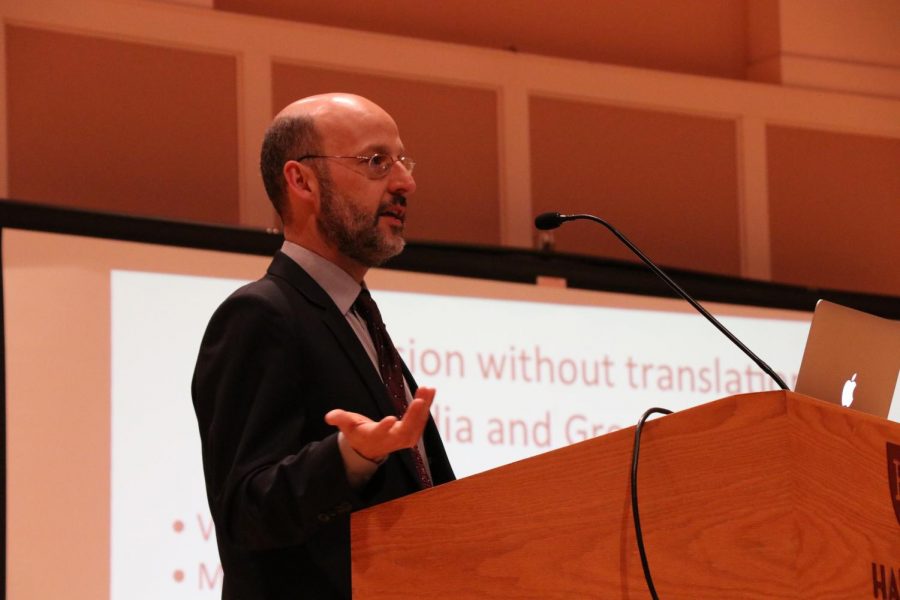Hanna Lecture uncovers new history
Dr. Peter Adamson provides a new perspective on the history of philosophy.
Professor Peter Adamson delivers the 2018 Hanna lecture.
April 18, 2018
Ancient history is new again in the philosophy department. On Thursday, Apr. 12, Dr. Peter Adamson showcased the missing links within the history of philosophy in his Hanna lecture.
“We are lucky to spend time with Dr. Adamson,” Professor Samuel Imbo stated. “He sees the mission of philosophy and doesn’t just do it in the classroom. He has published numerous papers that scholars regularly pore over.”
Adamson, a professor at Ludwig Maximilian University of Munich was brought to Hamline’s campus through the Hanna Lecture Series to present his lecture, Philosophy Without Borders: Intellectual Exchange between India, Europe, Islam and Africa.
“The Hanna series started in 1982, when Paul Robert and Jean Shuman wanted to remember their time at Hamline and show their appreciation to their teacher, Professor Gregory Dexter Walcott,” Imbo stated. “The lectures are meant to bring a distinguished scholar in philosophy of national and international reputation to Hamline.”
Adamson presented on the history of philosophy he recently uncovered a couple months ago when doing research for his podcast, ‘Philosophy without Borders.’
“Philosophy doesn’t begin in ancient Greece,” Adamson said. “Philosophical material can be traced to Babylon, Egypt, India and China. Philosophy started at least twice in India and China.”
After addressing the wide range of philosophy around the world not cut off by trade, he addressed the danger of dividing philosophy into terms of East and West.
“Even well intentioned people that want to decolonize philosophy will talk about Eastern and Western philosophy,” Adamson said. “Influence came from all directions.”
While debunking the colonization myth of philosophy, Adamson also disputed that philosophy is spread by people talking about it.
“I am skeptical about philosophy being spread through talking,” Adamson said. “Really profound philosophy translations require texts to include all the nuances.”
At the end of the lecture, Adamson closed with what every first-year hears about the textbooks they read.
“Be skeptical,” Adamson said. “The narratives we are fed about the history of philosophy, even the revised ones are misleading. Question me, I only uncovered this several months ago before I believed the revised history.”
After his lecture, philosophy students and alumni visited in the lobby about the successes and shortcomings of the presentation.
“This is just another examples of how the philosophy department make events that are heart and mind opening,” junior Bashir Imady said. “It really opens the floor for conversation.”
A group of alumni praised and questioned the presentation.
“The project is very fresh and doesn’t get done in philosophy,” said 2001 graduate in philosophy Kat Hoelm. “ We will never completely agree with all aspects of the presentation, but that may make for a good lecture.”
While the jury is still out on the history of philosophy, Adamson has spread the passion for philosophy within the Hamline community.
Through his work with his podcast and papers, he has inspired others to partake in the discussion.
“The other day I was signing a student’s major declaration form for philosophy,” Assistant Professor Gary Gabor said. “They said that they couldn’t take all the credit for their decision. It was Adamson’s podcast that inspired them to major in philosophy.”

